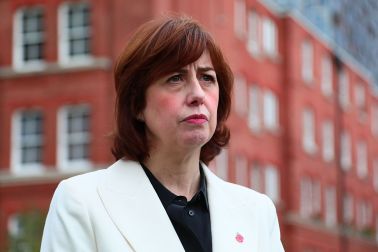Our reaction to Jade’s death shows that we are ready to elect an Old Etonian as PM
What does the death of Jade Goody tell us about the way we live now? For some, the fact that her battle with terminal cancer became such a three-ring media circus will be a cause of despair. Are there no areas of our lives that should be regarded as private? From now on, celebrities will have to add another stage to the five that Elisabeth Kübler-Ross said all people go through when dealing with their imminent death: denial, anger, bargaining, depression, acceptance and — a phone call to Max Clifford.
I prefer to see it as a cause of hope. For me, the most striking thing about the last few weeks of Jade’s life was the almost universal outpouring of compassion. As recently as ten years ago, whether or not a person took an interest in the plight of someone like Jade would have depended on what class they belonged to. The further you travelled up the class ladder, the less sympathy you would have found. By the time you reached the foothills of the upper-middle class, you would have encountered a familiar combination of snobbery and disapproval — and if you claimed to be moved by the plight of this young woman, you would have been regarded as a member of an alien species.
Something of this attitude was detectable in the chattering classes’ reaction to the death of Princess Diana. The public outpouring of grief — and the profession of concern for ‘her boys’ — was viewed as almost incomprehensible by the educated middle class. Among members of the aristocracy, this public display of emotion produced feelings of revulsion, a phenomenon that was dramatised in The Queen. Imagine how these same people would have reacted if the death of a reality TV star had provoked a similar response.
Yet, 12 years on, the class-based discrepancy in people’s reactions to the death of a young woman (also the mother of two boys) has all but disappeared. Over the past six weeks, as I made my usual rounds of book launches, dinner parties and so forth, I was constantly struck by how little snobbery I encountered in people’s attitudes to Jade’s illness. On the contrary, nearly everyone I met was genuinely sympathetic. In this respect at least, Britain in 2009 seems like a classless society.
The corollary of this, of course, is that Britain appears ready to handle an Old Etonian prime minister for the first time since 1964. The decontamination of that particular brand — the fact that having been to Eton is no longer considered an insurmountable obstacle in British politics — is another remarkable phenomenon of the last ten years. Just as members of David Cameron’s class no longer consider the underprivileged background of someone like Jade to be a reason to withhold their sympathy, so members of Jade’s class no longer consider the overprivileged background of someone like Dave to be a reason to withhold their votes. Indeed, Jade herself maintained that the reason she sold her story was so her sons could be privately educated. The politics of envy have been replaced by the politics of aspiration.
Forget Northern Ireland. The dissipation of class differences is the true legacy of Tony Blair. God knows he had his shortcomings, but when Blair left office Britain was a nation more at ease with itself than it was ten years earlier. With the exception of the hunting ban, the most significant thing about New Labour was the cessation of class hostilities that accompanied its arrival in power. This was signalled by the granting of independence to the Bank of England, followed by Tony and Gordon’s unceasing courtship of the City — a policy now regarded as disastrous from an economic point of view, but which undoubtedly paid dividends socially. The fact that Blair had been educated at one of Britain’s best public schools, and defended the right of parents to educate their own children privately, helped to break down the association in the public’s mind between toffs and public schools. Post-Blair, even Jade Goody could embrace private education without jeopardising her status as a working-class hero.
The irony is that Blair has paved the way for what John Prescott calls ‘the Eton mob’. Now that we live in a less class-conscious nation, being a member of the old-fashioned ruling class is not considered a barrier to high office. As we shed a tear for Jade Goody, we should bear in mind that she and David Cameron are two sides of the same coin.






Comments